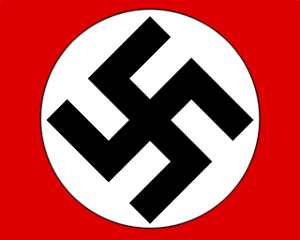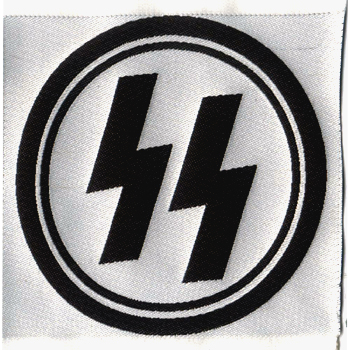 It is usually considered bad practice to compare groups that you don't like with Nazis. This comparison is made so often, however, that it has earned its own name: Godwin's Law. The "law" states that most discussions on the Internet newsgroups invariably end with one part accusing the other part of being a Nazi, and that this accusation marks the end of any constructive debate. The reason is that discussions often become more heated and invectives become more fierce, and because "Nazi" is considered the worst you can say, this invective indicates that the debate has removed the parties as far as possible. The rule is virtually universal, but there is an obvious situation where it does not apply: if your opponent is a genuine nazi, it is absolutely fair to refer to the opponent as a Nazi! This is noted in the Godwin's Law FAQ, which dryly observes that this law is not useful by neither part. It suggests one talks about Nazis instead of talking with Nazis.
It is usually considered bad practice to compare groups that you don't like with Nazis. This comparison is made so often, however, that it has earned its own name: Godwin's Law. The "law" states that most discussions on the Internet newsgroups invariably end with one part accusing the other part of being a Nazi, and that this accusation marks the end of any constructive debate. The reason is that discussions often become more heated and invectives become more fierce, and because "Nazi" is considered the worst you can say, this invective indicates that the debate has removed the parties as far as possible. The rule is virtually universal, but there is an obvious situation where it does not apply: if your opponent is a genuine nazi, it is absolutely fair to refer to the opponent as a Nazi! This is noted in the Godwin's Law FAQ, which dryly observes that this law is not useful by neither part. It suggests one talks about Nazis instead of talking with Nazis.
There is a gray area, however, where the person you debate with is a Nazi in every respect, except that the person himself or herself either won't admit or doesn't believe he or she is a Nazi. If you refer to the person as a Nazi, you'll be correct, but the person will be insulted either for political reasons or as a result of ignorance.
There is a certain fairness in accepting that if someone rejects a particular name, one should at least consider honoring the rejection. It should not be honored uncritically, however; if a Holocaust denier argues in favor of Nazism cannot be called a Nazi simply because he or she claims (or believes) to be otherwise, the person's rejection cannot have much weight. Compare it with the situation with athletes from Eastern Europe or China some decades ago, who officially were "unprofessional" athletes but whom anyone knew were 100% dedicated to their sport by their respective countries, and only were allowed in the Olympic games because their countries emphasized that they were not paid. In any sense but the strictest level of formality, obviously these athletes were professional; anything else is a matter of words. (This recurring conflict solved itself as commercial interests in other countries began to sponsor the athletes who could also no longer unambiguiously be considered amateurs.)
There is thus a lower limit for not belonging to a particular group: you may be so similar that it does not make sense to consider you different. You are not necessarily the person you think you are, or what you attempt to convince others that you are. Some of my close relatives were members of the Nazi party during the Second World War; one was an SS officer and the other was honored with a seat next to the Führer at one of his birthday parties. If anyone were Nazis in Germany in the 1930'es and 1940'es, it would these two people. I knew them both as very pleasant human beings who would always contribute positively to any occasion, and who did so out of genuine interest, not as an attempt to make up for their pasts.
Some of my close relatives were members of the Nazi party during the Second World War; one was an SS officer and the other was honored with a seat next to the Führer at one of his birthday parties. If anyone were Nazis in Germany in the 1930'es and 1940'es, it would these two people. I knew them both as very pleasant human beings who would always contribute positively to any occasion, and who did so out of genuine interest, not as an attempt to make up for their pasts.
Many Nazis at that time must have held much more moderate beliefs than these two people, and some presumably smaller number must have been less moderate. This indicates that here, too, there has to be a lower limit of how excluding the definition of Nazism can be, because if there were not many "degrees" of being a Nazi, how many people would qualify? If you narrow Nazism to a phenomenon that could only describe a tiny number of exceptionally cruel individuals, then how could there be so many millions of Nazis in Germany before and after the Second World War? Were these millions of Nazis in the period between 1920 and 1945 really so similar that there were no small or even considerable differences? Did they all disappear, and with them also nazism, as through magic when Germany lost the war? If the definition of Nazism is so narrow that it does not fit anyone, were there even Nazis in Germany before and during the Second World War?
The answers are as obvious as they may be discomforting: firstly, Nazism covered a wide array of people because otherwise there could never have been that many Nazis. Secondly, Nazis did not radically change their opinions on the night between August 2nd and August 3rd, 1945 after the Potsdam conference; they just knew to keep their mouths shut. In short, Nazis were humans, and humans are different. Nazism was found in many shades and different Nazis had different emphasis on its ideological core principles. There is not a single, precise weighting but rather an inclusive sphere spanneing various weightings of core ideologies, and they did not simply vanish from the many options provided by human consciousness. It is this fact that make the answer discomforting: if Nazism fills a spacious sphere of different opinions and does not unequivocally demand that one behaves like a Hollywood Nazi archetype, then it means that we are surrounded by people who would have been clearly recognizable as Nazis by the standards of Germany, 1930.
More specifically: a number of core principles outlined a circle around the many different Nazis of the 1920'es and 1930'es. If a group of people today believes in core principles that by and large are contained within this circle, then this group would have been part of contemporary Nazism had the group existed back then.
The strong condemnation of the horrors of World War II has created a fear of contact with Nazism, which has a very unfortunate side effect: the post-war descriptions of the horrors during the Second World War has created an anthropomorphism, that is, they have transformed Nazis into a symbol of the horrors. The post-war condemnations have created the mythical Nazi—the spectre of the worst thinkable human being, all of the Nazi horrors integrated into a single person.
The mythical Nazi is mythical, because the mythical person does not exist. The Nazis of the real world were not like the mythical Nazi. The mythical Nazi and the real Nazi appear in different realities. The mythical Nazi is found in the world where you find dragons, trolls, and other monsters. The real Nazi is found in our own world. These Nazis had many opinions and values, dreams and ideas, hopes and plans, and they were human beings of flesh and blood like the rest of us.
When you speak of the real Nazis, you must not confuse them with the mythological Nazi. The two phenomena are completely different, and any commingling of them will turn the discussion meaningless. Think of the word "bat," which takes on completely different meanings depending on whether you are talking about animas or sports. If you assume one meaning in another context, you will not be making any sense.
The notion of the mythical Nazi is unfortunate because it makes it difficult (if not impossible) to recognize real Nazis. You will never spot a real Nazi if you believe that a real Nazi can only be recognized by the traits of the mythical Nazi, because you will be gazing into a fantacy world that is not populated by real, existing people. It may be compared to question that my four year old son asked one night when he gazed into the night sky: he asked what all the glowing dots were and why there were no stars. It turned out that he had learned through images and stories that stars are five-pointed and big, and therefore did not recognize the real stars. Like my little son did not recognize the real stars, you will not recognize the real Nazis around you if you think they must all be like the mythical Nazi.
People who would be recognized as Nazis with no shread of doubt in the 1930'es, and who might even have known so themselves, can now get away with Nazi positions without anyone—or even themselves—realizing it. If someone points out that there is remarkable agreement between the opinions, either Godwin's law applies, or popular belief in the mythical Nazi is so strong that others cannot relate the concept of a Nazi to anything real and present. The post-war chase after Nazis was justified by portraying the nazis as so evil that they could be outlawed. But this justification created a Nazi monster that was so terrifying that no one can recognize its much more commonplace face. Nazis of today are unlike the mythical Nazi, because the mythical Nazi never existed. Nazis of today are not necessarily goose-stepping down the Straße, do not necessarily wear armbands, and do not necessarily call themselves Nazis. Only the mythical Nazi does all of this, as well as the few individuals who attempt an ostensive act of the universe of the mythical symbol.
Nazis of today are unlike the mythical Nazi, because the mythical Nazi never existed. Nazis of today are not necessarily goose-stepping down the Straße, do not necessarily wear armbands, and do not necessarily call themselves Nazis. Only the mythical Nazi does all of this, as well as the few individuals who attempt an ostensive act of the universe of the mythical symbol.
Germany had millions of Nazis back then. How many of these Nazis were shouting "Heil!" in the streets back then? How many of those who even knew about the persecution of the Jews played any active role in it? How many of them wore a Swastika as jewelry? How many of them believed that their own children should be killed if they had physical disabilities? How many of them were interested in Hitler's religious mysticism? When not even the majority of the Nazis back then were anything like the mytical Nazi, why demand that Nazis of today should look like this mythical being before they can reasonably be called Nazis? Or rather: why not call them Nazis if they otherwise are like the Nazis of the past, just because a mythical creature has been invented that does not exist?
Belief in the mythical Nazi must be cast away to all other superstition of witches, trolls, ghosts, and dragons. We must realize that the Nazi of today is like the Nazis of the past with mostly the same opinions, values, ideas, and desires. And we must remember what these opinions were, and that they can only be implemented by repeating the horrors of World War II. We do not exorcise Nazism by denying to read Adolf Hitler's Mein Kampf, believing it may turn us into the mythical Nazi; instead, reading the book, whose language is no harsher than that of an average politician, might open your eyes to very real Nazis around you. We must recognize Nazism today by any name if we wish to ensure that History does not repeat itself.


Leave a comment